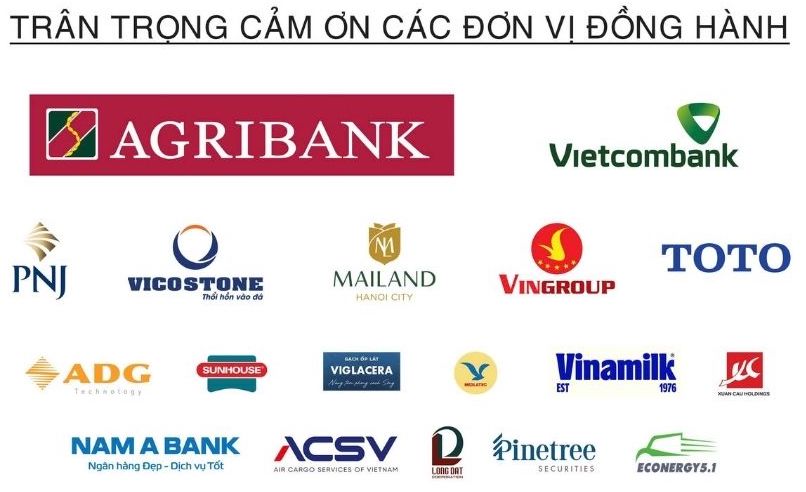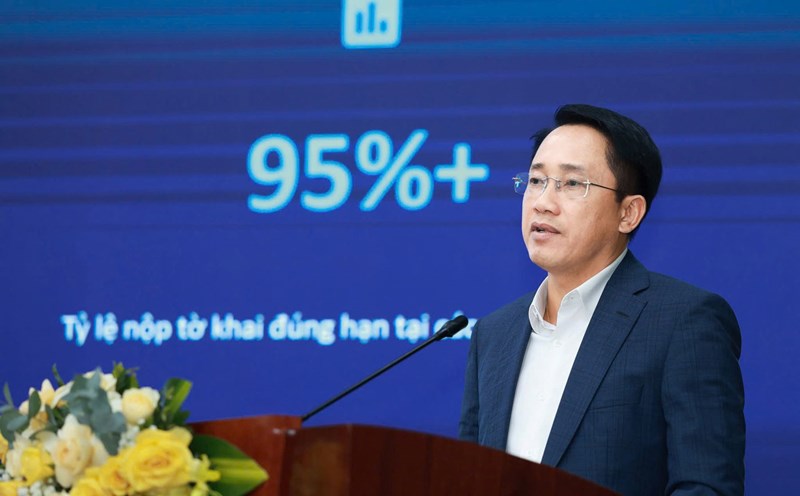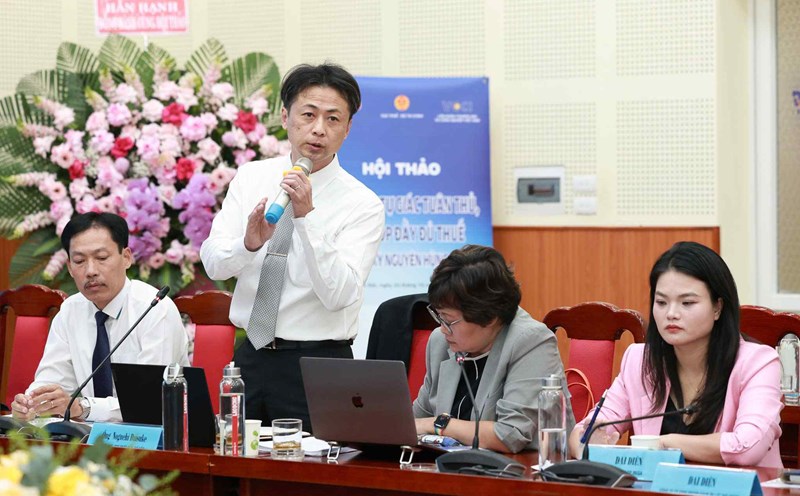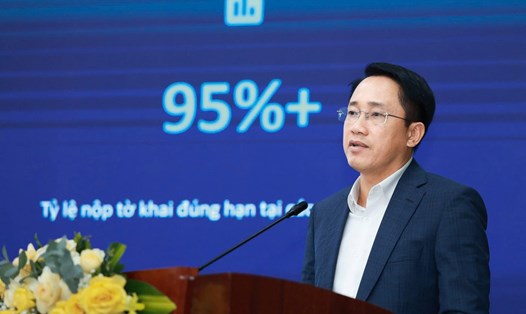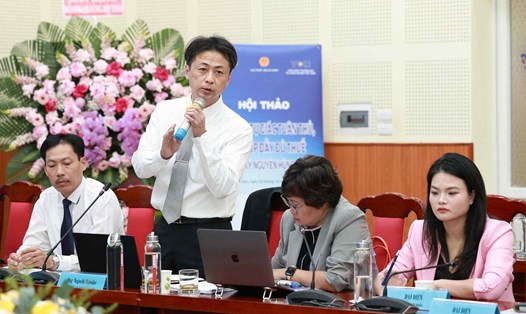Stabilizing tax policies and their relationship with strengthening trust and reducing compliance costs
In Vietnam, the stability of tax policies is reflected in guiding documents of the Party and State, in which the goal of building a synchronous, transparent, fair, easy-to-implement and stable tax policy system in the long term is regularly emphasized.
The Resolution of the 13th National Party Congress sets a target that by 2030, Vietnam will be a developing country with modern industry and high average income; by 2045, Vietnam will become a developed country with high income. The documents of the 13th National Party Congress have identified reforming the tax policy system as a key task to create momentum for economic development.
Decision No. 508/QD-TTg dated April 23, 2022 of the Prime Minister approving the Tax System Reform Strategy to 2030.
Stabilizing Vietnam's tax policy and its role in strengthening the trust of businesses and people
Regarding taxable subjects, non-taxable subjects and tax-exempt and reduced subjects
personal income tax is added to personal income (salary, wages and income from investment, transfer, business), ensuring stability in regulating personal income, especially income from labor. The principle of deduction for individuals who pay taxes and dependents is maintained, only the deduction level is adjusted according to inflation.
Other taxes (TTDB, resources, land, environment, etc.) regulate the behavior of using, exploiting resources or special consumption. The taxable subjects in the Southern Capital Tax Law demonstrate very high structural stability, including: residential land (rural, urban), production and business land. However, the tax base is not wide enough (only hit on land, not on constructions on land) reducing the collection efficiency.
Subjects who are not subject to tax or are exempted from or have reduced taxes are motivated by social goals, efficiency in management or international practices, and also ensure high stability. These are health and education services not subject to VAT; income from amortments exempted from personal income tax; land used for public purposes (communication, irrigation, health, education), national defense and security land, land used by religious establishments that are not subject to SDDNN tax...
Regarding corporate income tax, regulations on corporate income tax exemption and reduction often focus on encouraging industries, priority development fields or disadvantaged economic regions or incentives for high-tech enterprises.
These incentives are often regulated with a specific and long-term application period (4 years of corporate income tax exemption, 50% reduction in the next 9 years), creating stability for large investment projects. In particular, according to Resolution No. 198/2025/QH15, newly established state-owned enterprises are exempt from corporate income tax for the first 03 years from the date of issuance of the Business Registration Certificate.
On tax calculation methods
The tax calculation method is the method of determining the amount of tax payable by taxpayers based on the basis of tax calculation and tax rate, prescribed for each tax type. This is an important step in the tax management chain, ensuring correct, sufficient and transparent collection.
Since the comprehensive tax reform in the period of 2008-2015, Vietnam has maintained a stable tax calculation method structure, with few fundamental changes, and only supplemented techniques to make transparency and comply with international standards. Some newly issued tax laws maintain the core tax calculation method, only adjust to increase clarity and adapt to the new context.
In the 2025 Law on Corporate Income Tax, the tax calculation method still maintains the traditional structure that has existed for more than 15 years: "The amount of corporate income tax payable in the tax calculation period is calculated by taxable income multiplied by tax rate", only adding the group of subjects to be applied the revenue ratio to simplify procedures for small businesses and business households. This stability helps businesses easily calculate tax obligations, suitable for accounting capacity of each scale group.
In addition, the 2025 Special Consumption Tax Law (effective from January 1, 2026), the percentage tax calculation method continues to be applied to goods and services that can determine transaction value (such as cars, karaoke services, casino) which has been applied stably since the 2008 Special Consumption Tax Law and the 2014 and 2016 amendments.
On the basis of tax calculation
VAT: the basis for tax calculation is the selling price without VAT for goods and services. This principle has always been maintained, ensuring that taxes are calculated on the added value of each stage, demonstrating stability in the indirect tax mechanism.
corporate income tax: the basis for calculating tax is taxable income (reasonable, valid revenue minus expenses and minus exemptions and reductions) to help businesses easily predict.
Special consumption tax: the basis for tax calculation is the selling price of the manufacturing and importing facility (or the service supply price). This is a stable basis applied to most luxury goods and services.
SDDNN Tax: the basis for tax calculation is the land area and land price according to the Land Price List prescribed by the Provincial People's Committee. This creates stability for the basis for calculating annual taxes of taxpayers, although actual land prices on the market may fluctuate.
Regarding tax rates
The common corporate income tax rate has remained stable at 20% since 2014 to present[1] (nearly 10 years) to ensure competitiveness and long-term forecasting. The 2025 Law on Corporate Income Tax also shows many new points that clearly demonstrate the spirit of reform, reducing the burden on the business sector, especially small-scale enterprises and creative startups.
The tax rate of 17% applies to enterprises with revenue from 03 billion VND/year to 50 billion VND/year; 15% for enterprises with revenue not exceeding 3 billion VND/year.
This is a policy that clearly demonstrates the State's concern in sharing difficulties, encouraging small-scale enterprises to create conditions for accumulation, investment expansion and restructuring operations in the spirit of Resolution No. 68/2025/QH15 and Resolution No. 198/2025/QH15.
VAT maintains a basic tax rate framework including standard tax rates of 10%, 5% and 0% applied from January 1, 2009 to present (more than 15 years) to facilitate businesses and people in determining tax obligations.
In the 05 period of 2021-2025, the Government will take measures to temporarily reduce VAT by 2% (from 10% to 8%) to support economic recovery and reduce difficulties for people and businesses.
However, this is a short-term measure, not changing the basic tax rate framework. The 2024 VAT Law has adjusted the tax rate for some goods and services transferred from 5% to 10% (unprocessed forest products; sugar and byproducts (meraca, mud); specialized equipment and tools for teaching, research, testing; cultural, sports activities, art performances, exhibitions, production and film screening) to narrow incentives and accurately reflect the value of goods and services.
In addition, adjusting the expansion of taxable subjects for some products from "not subject to tax" to "5% tax" (fertilizer; fishing vessels) to help businesses deduct input tax, reduce production costs, fully reflect the value chain; adding to applying a 0% tax rate for goods and services serving international export and transportation such as: international transportation, construction works abroad; goods sold in quarantine areas, tax-free stores; aviation and maritime services provided for international transportation. This adjustment does not increase the tax burden, but improves structure and neutrality.
Special consumption tax also maintains stable tax rates for most taxable items from 2016 to present: beer, alcohol: 35-65%; cars with less than 9 seats: 35-150% depending on capacity; cigarettes: 75%; casino services, games with prizes: 35%.
The 2025 Special Consumption Tax Law (effective in 2026) does not change the tax rate framework, only stipulates more clearly the time of application and the tax calculation method (percent or absolute) to ensure long-term stability of tax structure, helping businesses predict costs better.
Regarding the frequency of amendments and supplements to tax laws
Important tax laws such as the Law on VAT, the Law on corporate Income Tax and the Law on personal income Tax... are often the focus of amendments and supplements. Law on VAT: There have been many important amendments and supplements such as in 2008, 2013 and most recently the Law on VAT 2024 (effective from July 1, 2025).
This shows that on average, there is one comprehensive or major change every 5 - 10 years. Similarly, the Law on corporate bonds has also undergone many notable amendments to suit practices and practices (amended in 2008, 2013, 2014, 2025). Tax laws are often guided in detail by Government Decrees and Circulars of the Ministry of Finance. These documents are adjusted very regularly (usually annually or even every half year) to resolve arising problems, supplement technical regulations, or promptly adjust tax exemption and reduction policies (recent Decrees reducing VAT by 2%).
The Law on Tax Administration (amended in 2019) and related Decrees are also regularly adjusted to integrate technology, use personal identification codes instead of personal tax codes, and strengthen electronic tax management.
Some recommendations
Consistency is the most basic pillar of tax policy stability and a direct factor in strengthening the confidence of entities. This consistency needs to be demonstrated at three levels: Law, Enforcement, and Regulation.
Regarding the law, guiding documents (Decrees, Circulars) must not conflict or go against the spirit of the original Law, avoiding the situation where the Law is stable but the detailed regulations are constantly changing, causing uncertainty and increasing the cost of hiring consultants. Regarding implementation, it is necessary to ensure consistency and unity in the application of tax policies between local tax departments, ending the same problem but being resolved differently depending on the area or tax officer.
In practice, decisions and answers from tax authorities must be respected and applied consistently over time, avoiding reprimand or denial of previously issued instructions. When consistency is maintained, the cost of compliance of businesses will be significantly reduced because they do not have to spend resources to research, monitor and deal with unsynchronized interpretations, thereby creating a fair and predictable investment environment.
